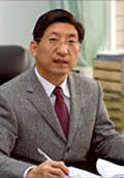- Name: Yi-Xin Zeng
- Title: Academician of the Chinese Academy of Sciences, Professor and Former President
- Email: zengyix@mail.sysu.edu.cn
- Phone:
Dr. Yi-Xin Zeng had been the President of Sun Yat-sen University Cancer Center since 1997 till 2013. He had served as the Director of State Key Laboratory of Oncology in South China since 2004. Now he is a professor and president of Peking Union Medical College. Dr. Zeng obtained his PhD and MD at Sun Yat-sen University of Medical Sciences in 1990. He was elected as member of the Chinese Academy of Science in 2005. He received his post-doc training on molecular mechanisms of cancer pathogenesis in Tokyo Metropolitan Institute of Gerontology, Tokyo University and University of Pennsylvania from 1992 to 1997. He was appointed as a professor of Sun Yat-sen University of Medical Sciences and vice president of Sun Yat-sen University Cancer Center after he returned to China in 1997. He was elected as Outstanding Young Teacher by Ministry of Education in 2002, Outstanding Young Expert by Ministry of Health in 2006.
His research is devoted to the pathogenesis of cancer and cancer biotherapy, with a focus on nasopharyngeal carcinoma (NPC) and Epstein-Barr virus (EBV), on which he has published over 300 papers in international famous journals including Nature, Nature Genetic and Cancer Research. He has been honored with many awards for his research, including Second Class Award for Natural Science Achievements (National Office for Science and Technology Awards, 2005), He-Liang-He-Li Award for Science and Technology Advancement (2007), Award for Outstanding Science and Technology Achievements in Guangdong Province (the People's Government of Guangdong Province, 2011).
Currently Dr. Zeng is leading the 863 program (National High Technology Research and Development Program of China) “Molecular Classification and Individualized Therapy for Major Diseases” and 973 program (National Basic Research Program of China) “Research on Mechanisms and Intervene of Oncogenic Virus”.
He served as the president of International Association of EB Virus and Related Diseases from 2006 to 2008. He is the chief editor of national postgraduate textbook Oncology designed by the Minister of Health, the Editor-in-chief of the Chinese Journal of Cancer and Vice Editor-in-chief of medicine undergraduate textbook Clinical Oncology. He has also acted as the vice president of China Anti-Cancer Association since 2007.
1. Identification and functional characterization of nasopharyngeal (NPC) susceptibility genes
2. Identification and functional characterization of NPC associated Epstein-Barr Virus (EBV) subtypes
3. Gene, EBV and environment interactions in the pathogenesis of NPC
4. Cancer biotherapy and intervene of EBV in the early stage of NPC pathogenesis
For information on Professor Zeng's laboratory, click here and select: Identify and Map the Susceptibility Genes Contributing to NPC.Howard Hughes Medical Institute, University of Pennsylvania School of Medicine, Research Associate, 1994 -1997
Institute of Medical Science, Tokyo University and Tokyo Metropolitan Institute of Gerontology, Posdoc Fellow, 1992 -1994
Sun Yat-sen University of Medical Sciences, Guangdong Province, China. M.D., Ph.D., 1990.
HengYang Medical College, Hunan Province, China. B.S. in Medicine, 1985.
1. Liu P, Fang X, Feng Z, Guo YM, Peng RJ, Liu T, Huang Z, Feng Y, Sun X, Xiong Z, Guo X, Pang SS, Wang B, Lv X, Feng FT, Li DJ, Chen LZ, Feng QS, Huang WL, ZengMS, Bei JX, Zhang Y, Zeng YX. Direct sequencing and characterization of aclinical isolate of Epstein-Barr virus from nasopharyngeal carcinoma tissue byusing next-generation sequencing technology. J Virol. 2011, 85(21):11291-9.
2. Bei JX, Li Y, Jia WH, Feng BJ, Zhou GQ, Chen LZ, Feng QS, Low HQ, Zhang H, He F, Tai ES, Kang TB, Liu ET, Liu JJ and Zeng YX. A genome-wide association study of nasopharyngeal carcinoma identifies three new susceptibility loci. Nat Genet. 2010, 42(7):599-603.
3. Liang Y, Zhong ZD, Huang Y, Deng W, Cao J, Tsao G, Liu Q, Pei DQ, Kan TB and Zeng YX. Stem-like cancer cells are inducible by increasing genomic instability in cancer cells. J Biol Chem. 2010, 285:4931-40.
4. Feng BJ, Huang W, Shugart YY, Lee MK, Zhang F, Xia JC, Wang HY, Huang TB, Jian SW, Huang P, Feng QS, Huang LX, Yu XJ, Li D, Chen LZ, Jia WH, Fang Y, Huang HM, Zhu JL, Liu XM, Zhao Y, Liu WQ, Deng MQ, Hu WH, Wu SX, Mo HY, Hong MF, King MC, Chen Z, Zeng YX. Genome-wide scan for familial nasopharyngeal carcinoma reveals evidence of linkage to chromosome 4. Nat Genet. 2002 ,31(4):395-9.
5. Somasundaram K, Zhang H, Zeng YX, Houvras Y, Peng Y, Zhang H, Wu GS, Licht JD, Weber BL, El-Deiry WS. Arrest of the cell cycle by the tumour-suppressor BRCA1 requires the CDK-inhibitor p21WAF1/CiP1. Nature. 1997, 11;389(6647):187-90.6. Zeng YX, Somasundaram K, el-Deiry WS. AP2 inhibits cancer cell growth and activates p21WAF1/CIP1 expression. Nat Genet. 1997,15(1):78-82.
Last updated on: 2011

